Donald Trump faces accusers: What to watch during his big speech

Donald Trump will give a speech designed to pivot from his impeachment to his drive for reelection.
Democrats face risks and limits in Donald Trump’s impeachment trial

“People ask the question, ‘Isn’t the president going to be stronger and harder to beat if he survives this?’ Yes, probably. But Congress has no choice,” remarked Joe Biden.
Donald Trump’s trial opens on fast track, Dems arguing for removal
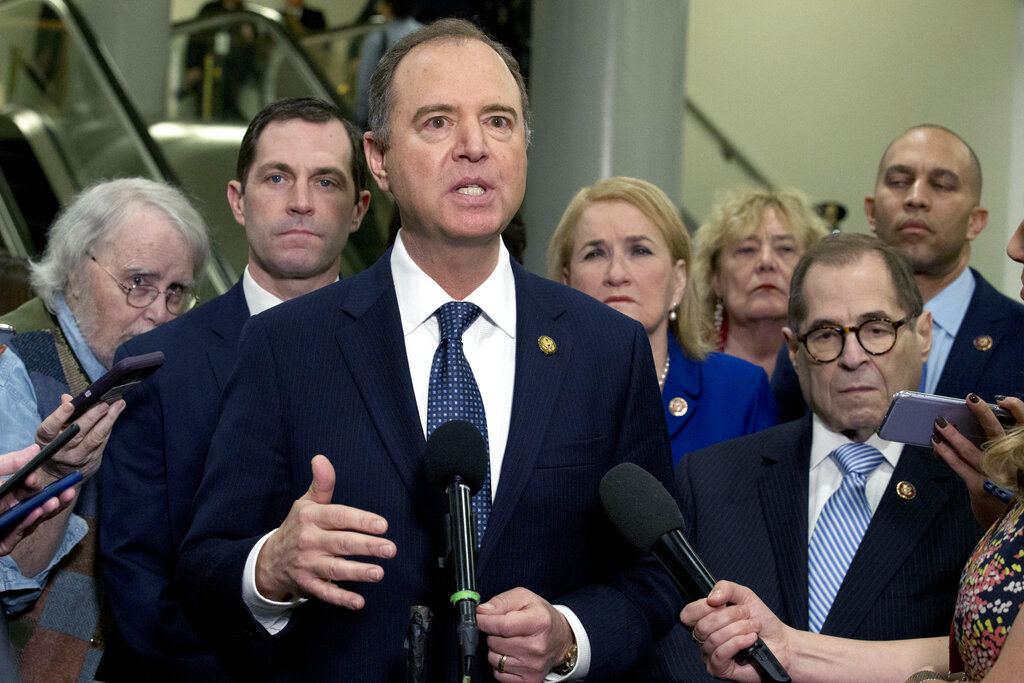
The House prosecutors will have 24 hours over the next three days to present their case.
Senator Tim Kaine says he has 51 votes to restrain Trump from further action on Iran
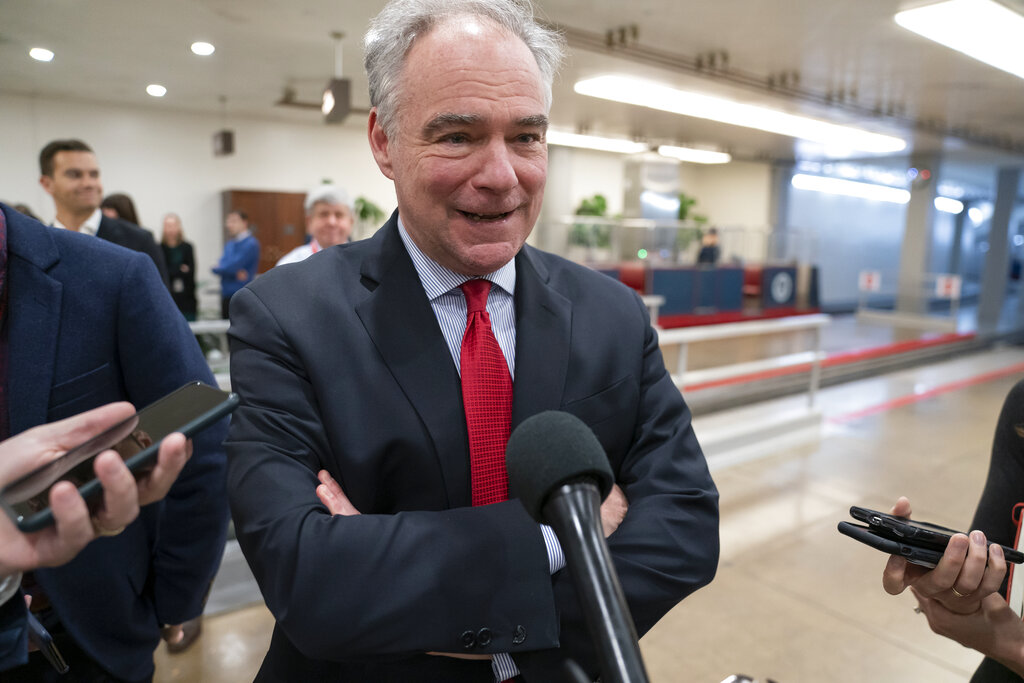
There are some Republicans in support of the measure, according to Kaine.
House Approves Measure to Restrain Trump’s Actions on Iran
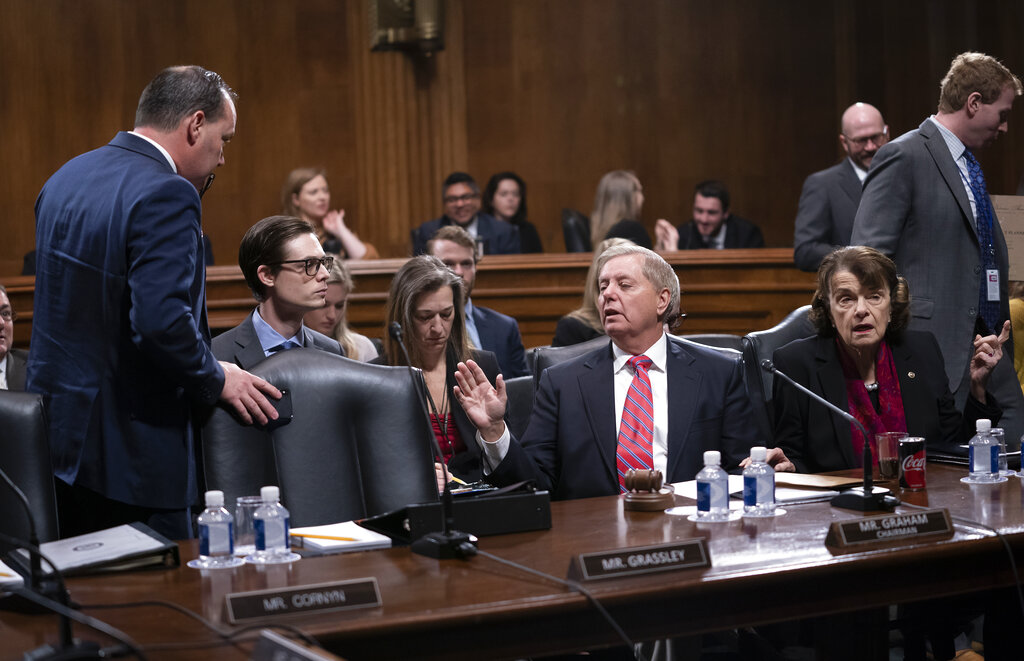
This resolution is not binding and is largely symbolic.
House to Vote on Restraining Trump’s Actions Against Iran

Republicans say the proposal does not have the force of law.
Donald Trump Doubles Down on Potential Strike Sites in Iran
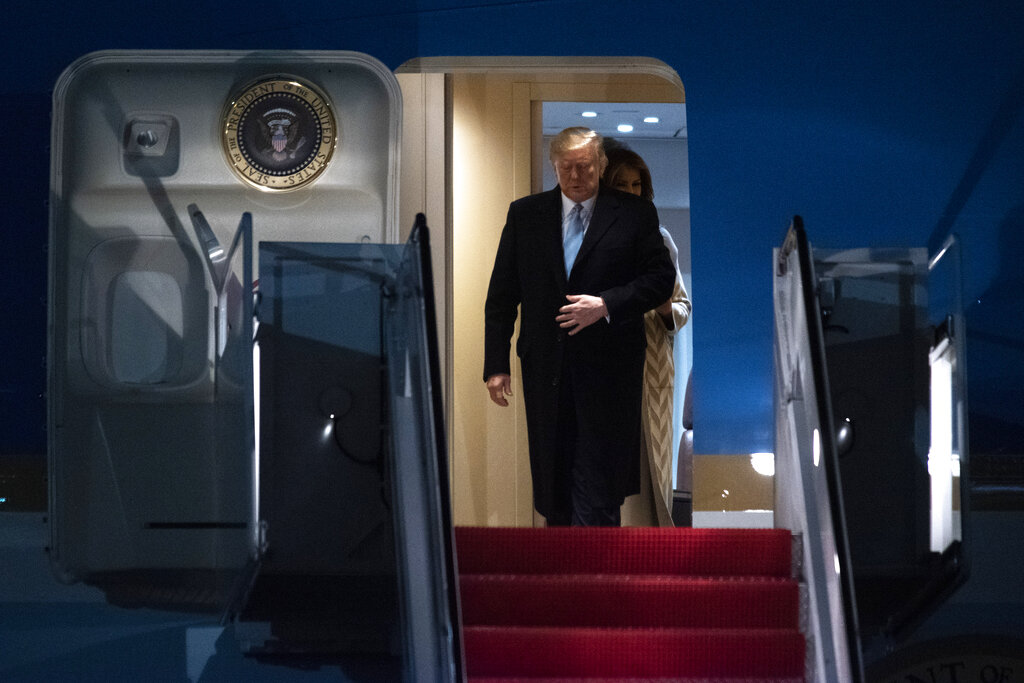
Donald Trump Says Iranian Cultural Sites are Fair Game.
Trump Returns to Washington to Face a Pair of Challenges
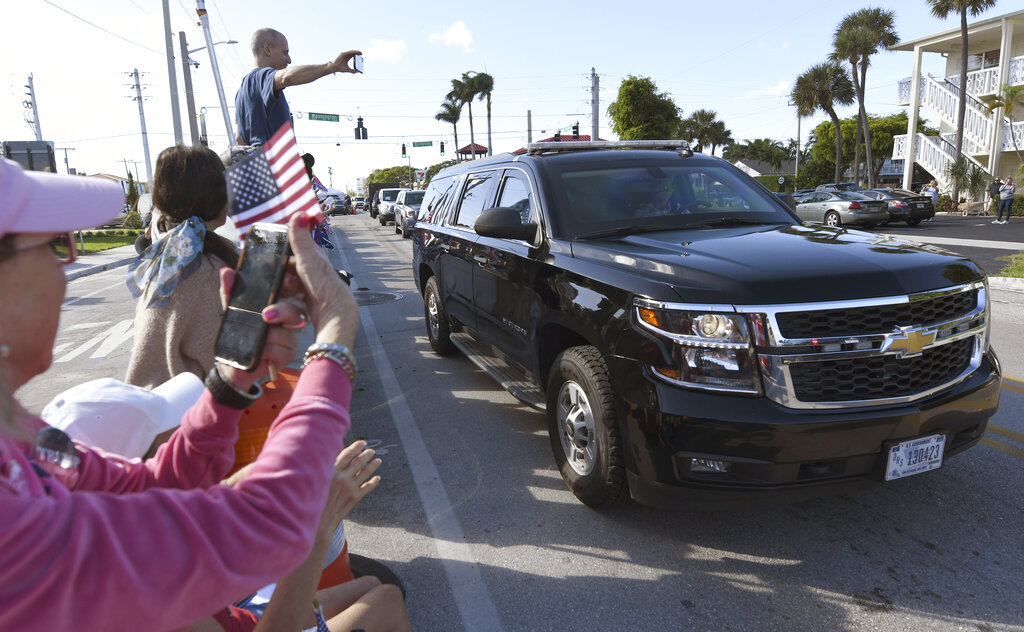
Donald Trump faces a new crisis in the Middle East and an upcoming Impeachment Trial.
Donald Trump wants drama, but GOP wants it over
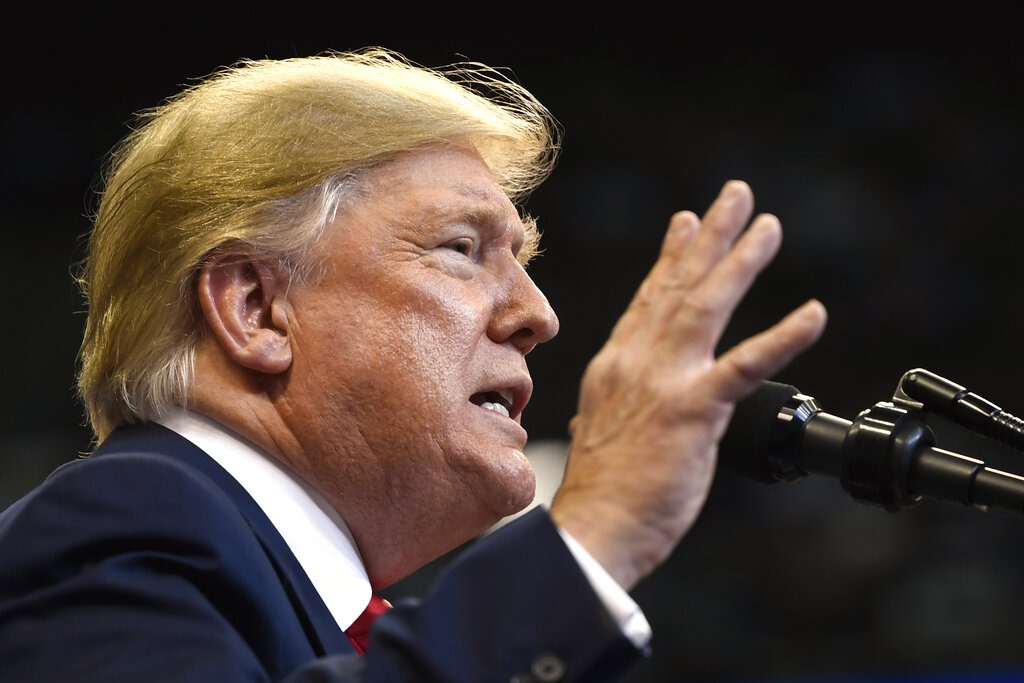
Donald Trump wants more than acquittal. He wants vindication. With impeachment by the House appearing certain, the president has made clear that he views the next step, a trial in the GOP-controlled Senate, as his focus. The president sees the senators not just as a jury deciding his fate, but as partners in a campaign to discredit and punish his Democratic opponents. His Senate allies aren’t so sure that’s a good idea. In recent weeks, Trump has devised a wish list of witnesses for the Senate trial, relishing the opportunity for his lawyers to finally cross-examine his accusers and argue the case that his actions toward Ukraine, including the July 25 call when he asked for a favor, were “perfect.” Trump and his allies have been building up the likely Senate trial, an effort to delegitimize the Democratic-controlled House’s impeachment process by contrast. In the Senate, the Trump team has argued, the president would get the opportunity to challenge witnesses and call some of his own, such as House Intelligence Committee Chairman Adam Schiff, the still-anonymous intelligence community whistleblower, or even Joe Biden and Hunter Biden. He sees that as a chance to embarrass Democrats, including the former vice president and 2020 Democratic rival, and use the friendlier ground to portray himself as the victim of a partisan crusade. “It is pretty clear the president wants a trial,” says Hogan Gidley, the principal deputy White House press secretary. “The president is eager to get his story out.” But it is increasingly clear that Senate Republicans, led by Majority Leader Mitch McConnell, have other ideas. McConnell, who is fiercely protective of his 53-47 Senate majority, has signaled that he wants none of the spectacle Trump desires. Instead he wants a swift trial, potentially with no new witnesses called. “Here’s what I would anticipate: The House managers would come over, make their arguments, the president’s lawyers would then respond. And at that point the Senate has two choices,” McConnell told reporters this week. “It could go down the path of calling witnesses and basically having another trial. Or it could decide — and again 51 members could make that decision — that they’ve heard enough.” In other words, the president, who is almost certain to be found not guilty by the Republican-controlled Senate, can win the hard way or the easy way. Senate Trump allies and advisers inside the White House have in recent days urged the president to temper his expectations and choose the path of least resistance. But Trump, according to three people familiar with the conversations, has responded by repeating his desire for a politically charged trial that drags the Bidens and others into the impeachment spotlight. Still, some aides believe Trump will ultimately relent to McConnell’s advice. Trump’s solicitation of Ukraine for investigations into the Bidens — while withholding military aide from the ally nation facing Russian aggression — forms the core of one article of impeachment against the president. His efforts to block the House investigation forms the second. On Capitol Hill, the emerging GOP consensus is that doing Trump’s defense his way would jeopardize a predictable outcome, test GOP’s fragile loyalties to him and open a Pandora’s Box of unanticipated consequences. “People are beginning to realize that could be a pretty messy and unproductive process,” Sen. Ron Johnson, R-Wis., said Wednesday. “If you start opening up to witnesses, you start opening up to all witnesses. And so I think the president’s got to really decide, to what extent does he want to start going down that road versus just making a strong case.” Democrats would be expected to retaliate by trying to call the president’s senior-most advisers, including acting chief of staff Mick Mulvaney and Secretary of State Mike Pompeo, and his personal attorney, Rudy Giuliani. Under Senate rules, McConnell’s ability to control the proceedings are limited. The Chief Justice of the United States, John Roberts, presides over the trial and any senator may be able to put a motion on witnesses up for a vote. That means defections by just a few GOP senators could thwart McConnell’s plans. With the Republicans slim majority, it’s not at all clear they want to start down the path of a full-blown trial. Should they try to call the whistle-blower or the Bidens to testify, they may not find enough votes of support from their ranks. At the same time, they would have to consider whether to accept or fend off witness requests from Democrats. McConnell also worries that a prolonged impeachment trial would not benefit the handful of GOP senators setting out in the new year on potentially tough reelection bids. Swing state Sens. Susan Collins in Maine, Cory Gardner in Colorado, Joni Ernst in Iowa and Martha McSally in Arizona are among those whose actions will be closely watched. They would much rather be talking about the economy or the pending U.S.-Mexico-Canada trade agreement than engaging in a prolonged, unpredictable impeachment trial. But Republicans also acknowledge they are unlikely to find the 51 votes needed to dismiss the charges against the president outright. Some vulnerable lawmakers and Trump skeptics, such as Sen. Mitt Romney of Utah who has said he is troubled by Trump’s actions, will insist on some semblance of trial. Comparisons are being made to the confirmation of Brett Kavanaugh to the Supreme Court, in which the Senate had to deal at length with allegations of sexual misconduct, though his confirmation by the Republicans was becoming increasingly apparent. “I think the American people are pretty tired of this,” says Sen. Pat Roberts, Republican-Kansas. “I think if we can honor the White House’s concern, OK. But let’s do it in a reasonable time limit. We don’t need six weeks like we did with Clinton.” Around the White House, a divide has emerged between aides and allies embracing the president’s call to use the Senate trial to get back at Democrats and those, particularly in the White House counsel’s office, advising him to heed the warnings of the GOP lawmakers.
What’s next in impeachment: Judiciary Committee up next?
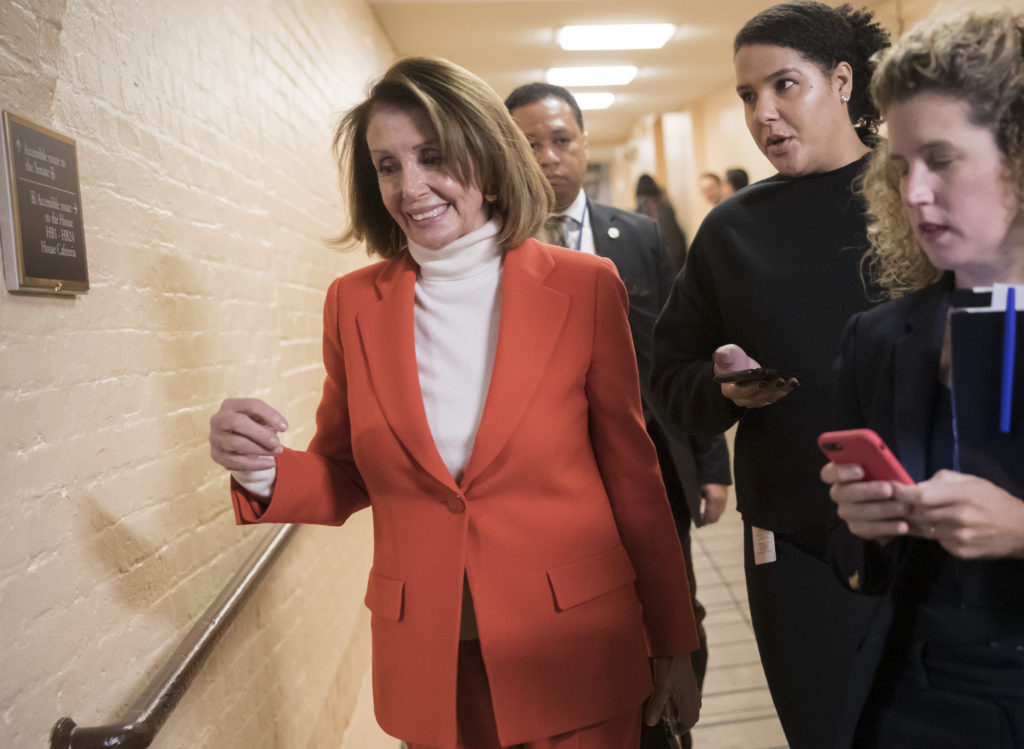
After two weeks of public hearings, Democrats could soon turn the impeachment process over to the House Judiciary Committee. They’re moving “expeditiously” ahead as House Speaker Nancy Pelosi has instructed. In the coming weeks, the House intelligence panel will submit a report to the Judiciary panel, and then Democrats will consider drafting articles of impeachment on President Donald Trump’s dealings with Ukraine and the administration’s attempts to block the investigation. The articles could cover matters beyond Trump’s efforts to push Ukraine to investigate Democrats, including special counsel Robert Mueller’s investigation, but no decisions have been made. There could be several steps along the way, including a Judiciary committee vote, a House floor vote and, finally, a Senate trial. What’s next in impeachment: INTELLIGENCE COMMITTEE WRAPS UP Democrats on the House intelligence committee believe they have enough evidence to write a report and move forward. But it’s still unclear whether they will hear any last-minute testimony. Democratic House Intelligence Committee Chairman Adam Schiff said Sunday he won’t foreclose the possibility of his committee undertaking more depositions and hearings in the impeachment inquiry of Trump. Schiff said on CNN’s “State of the Union” that his committee continues to conduct investigative work, but he won’t let the Trump administration stall the inquiry. Schiff’s staff and others are compiling the panel’s findings to submit to the House Judiciary Committee, which is expected to open its own hearings to consider articles of impeachment and a formal recommendation of charges. He said his committee may need to file addendums to its report so that the Judiciary Committee can move ahead. “The investigation isn’t going to end,” Schiff said. Several potentially key witnesses — former national security adviser John Bolton, acting White House chief of staff Mick Mulvaney, Energy Secretary Rick Perry and Secretary of State Mike Pompeo, among others — have declined to provide testimony or documents on Trump’s orders. Democrats have said they don’t want to get tied up in lengthy court battles to force those witnesses to cooperate with subpoenas. But they could still hear testimony if one of them changed their mind, or if other key witnesses emerged. “We’ve heard and seen compelling evidence that the president committed serious wrongdoing,” says Texas Rep. Joaquin Castro, a member of the intelligence panel. “There are other witnesses, including some principal witnesses that we would have liked to have heard from, but the evidence has been pretty damning that the president committed an impeachable act.” Time is running short if the House is to vote on impeachment by Christmas, which Democrats privately say is the goal. The intelligence panel is expected to spend the Thanksgiving week writing, and maybe even completing, a report of evidence gathered through more than six weeks of closed-door depositions and public hearings. Once the report is done, the panel could vote to pass it on to the House Judiciary Committee. That could happen as soon as the first week of December, when lawmakers return from the Thanksgiving break. JUDICIARY TAKES CHARGE Pelosi has instructed the intelligence panel, along with other committees that have investigated Trump, to submit evidence to the House Judiciary Committee. That panel is then expected to hold hearings and vote on articles of impeachment — a process that could take up the first two weeks of December. The articles of impeachment are expected to mostly focus on Ukraine, though discussions continue. Democrats are considering an overall “abuse of power” article against Trump, which could be broken into categories like bribery or extortion. The article would center on the Democrats’ assertion, based on witness testimony, that Trump used his office to pressure Ukraine into politically motivated investigations. Additional articles of impeachment could include obstruction of Congress and obstruction of justice. The latter could incorporate evidence from Mueller’s report. HOUSE FLOOR VOTE The Judiciary panel could take several days to debate the articles and then vote on them — sending impeachment to the House floor, where they could immediately be called up for consideration. Debate on impeachment would be handled similarly to any other bill or resolution. If articles of impeachment reach the House floor, Democrats will be looking to peel off Republicans to make the vote bipartisan. So far, however, it appears few, if any, Republicans will break ranks. Not a single Republican backed the resolution launching the impeachment hearings. Once an impeachment vote is done, Democrats would appoint impeachment managers for a Senate trial. SENATE TRIAL House Democrats are hoping to be finished with an impeachment vote by Christmas, sending articles to the Republican-controlled Senate for a trial in 2020. Unless political dynamics change, Trump is expected to have the backing of majority Republicans in that chamber to be acquitted. It’s still unclear how long a trial would last, what it would look like or what witnesses might be called. Top White House officials met Thursday with Republican senators to discuss strategy but made no decisions about the length of a trial or other tactics, two people familiar with the session said. Participants in the meeting expressed more interest in voting as soon as they have the 51 votes needed to acquit Trump than in setting a specific timetable for the proceedings, according to one Senate GOP aide. That aide and a senior White House official said a trial lasting two weeks was discussed, but not agreed to. The aides spoke on condition of anonymity to describe a private meeting. By Mary Clare Jalonick Associated Press. Associated Press writer Alan Fram contributed to this report. Republished with the permission of the Associated Press.
State Department worried about defending ambassador
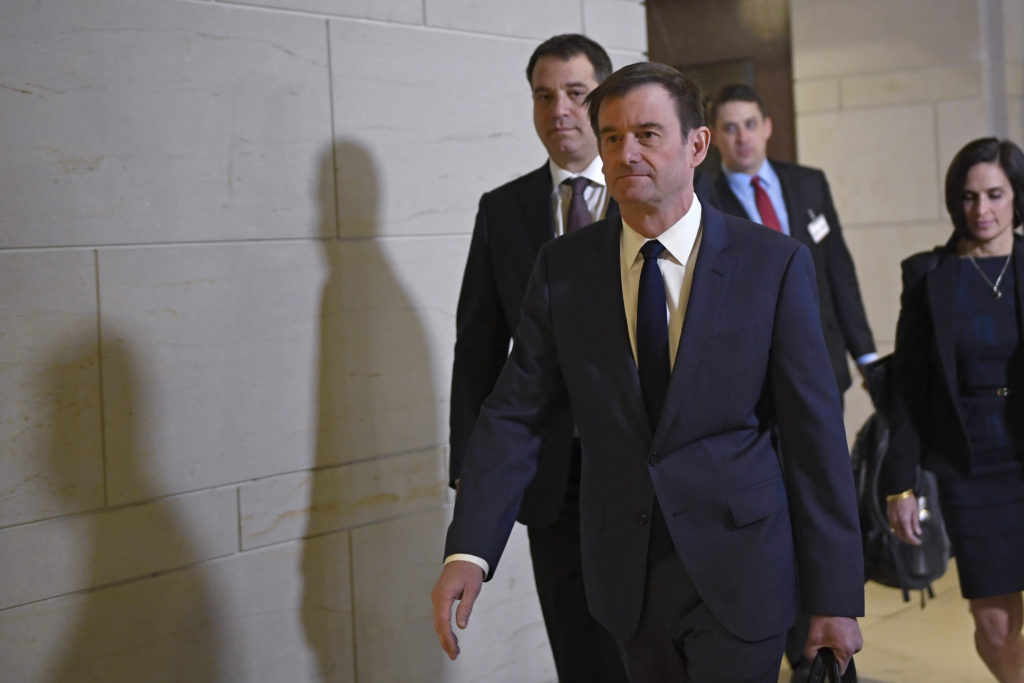
The State Department’s third-ranking official is expected to tell House impeachment investigators Wednesday that political considerations were behind the agency’s refusal to deliver a robust defense of the former U.S. ambassador to Ukraine. People familiar with the matter say the highest-ranking career diplomat in the foreign service, David Hale, plans to say that Secretary of State Mike Pompeo and other senior officials determined that defending Ambassador Marie Yovanovitch would hurt the effort to free up U.S. military assistance to Ukraine. Hale, who arrived Wednesday morning to testify behind closed doors, will also say that the State Department worried about the reaction from President Donald Trump’s personal attorney Rudy Giuliani, also one of the strongest advocates for removing the ambassador. Meanwhile, State Department Counselor T. Ulrich Brechbuhl, who was subpoenaed to appear before the impeachment panel, was on the plane with Pompeo, who departed early Wednesday morning for Germany. Two other witnesses who were scheduled for Wednesday — Russ Vought, the acting director of the White House Office of Management and Budget, and Rick Perry, the Energy secretary — are not expected to show up. Yovanovitch, who was removed from her posting in May, has already appeared before investigators in the impeachment inquiry into Trump. She detailed efforts by Giuliani and other Trump allies to push her out of Ukraine, testifying that a senior Ukrainian official told her that “I really needed to watch my back.” Hale is expected to shed more light on why the State Department did not step up to defend its top envoy in Kyiv. According to the people familiar with the matter, he will say he tried to distance himself and the department from the matter by removing himself from email chains about Yovanovitch. Hale, for example, never responded to an email sent by former top Pompeo adviser Michael McKinley urging Pompeo to speak out in defense of Yovanovitch after the White House released a partial transcript of Trump’s phone call with Ukrainian President Volodymyr Zelenskiy, the officials said. One official said Hale had “tried to take himself out of the loop on Ukraine.” But another official said Hale would defend Pompeo’s actions as “politically smart” for the State Department and its employees in the long run. The people familiar with the matter were not authorized to discuss Hale’s appearance publicly and spoke on the condition of anonymity. Hale, a fluent Arabic speaker who joined the foreign service in 1984, has served as ambassador to Lebanon, Pakistan and Jordan and in posts in Tunisia, Bahrain and Saudi Arabia. By Matthew Lee AP Diplomatic Writer. Republished with the permission of the Associated Press.
Donald Trump strains to balance diplomacy, military threat to Iran
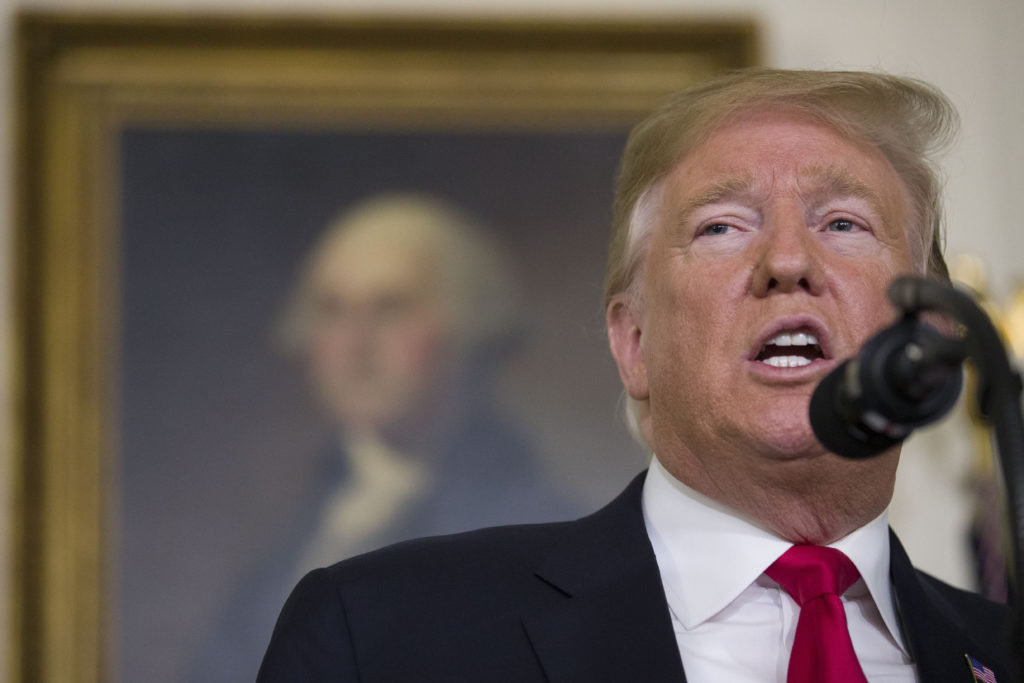
The Trump administration tried to balance diplomacy with fresh talk of military action Tuesday in response to the fiery missile and drone attack on the heart of Saudi Arabia’s oil industry — a strike marking the most explosive consequence yet of the “maximum pressure” U.S. economic campaign against Iran. Secretary of State Mike Pompeo was headed to Jiddah in Saudi Arabia to discuss possible responses to what U.S. officials believe was an attack coming from Iranian soil. President Donald Trump said he’d “prefer not” to meet with Iranian President Hassan Rouhani at next week’s U.N. session but “I never rule anything out.” Iran continued to deny involvement in last weekend’s attack on Saudi Arabia’s Abqaiq oil processing plant and its Khurais oil field, a strike that interrupted the equivalent of about 5 percent of the world’s daily supply. Saudi Arabia’s energy minister said Tuesday that more than half of the country’s daily crude oil production that was knocked out by the attack had been recovered and production capacity at the targeted plants would be fully restored by the end of the month. The Trump administration was moving cautiously as it navigated competing impulses — seeking to keep up a pressure campaign aimed at forcing Tehran to negotiate on broader issues with the U.S. while deterring any further Iranian attacks and avoiding another Middle East war. It all was occurring as the administration deals with a host of other foreign policy issues and has no national security adviser, following the recent ouster of John Bolton. Echoing Trump’s warning from earlier in the week, Vice President Mike Pence said American forces were “locked and loaded” for war if needed. But he also noted that Trump said he doesn’t want war with Iran or anyone else. “As the president said yesterday, it’s ‘certainly looking like’ Iran was behind these attacks,” Pence said. “And our intelligence community at this very hour is working diligently to review the evidence.” The analysts’ task was to connect the dots provided by satellite data and other highly classified intelligence with physical evidence from the scene of the attack, which American-provided Saudi defenses had failed to stop. Fourteen months before voters will decide on Trump’s reelection, he is increasingly mindful of his 2016 campaign promises, including his pledge to bring American troops home after nearly two decades of continuous war. But he also promised to apply fresh pressure on Iran, a pledge complicated by the latest apparent provocation. The at-times divergent messages from his administration, officials say, mirror internal staff divisions and even the president’s own hesitations. “You know, I’m not looking to get into new conflict,” Trump said Monday, “but sometimes you have to.” Aides say he’s taking a prudent pause. “The president’s being cautious, and if he were banging the gong today about Iran being the culprit, inevitably, without presenting the case to the American people, everyone would be saying he’s a warmonger,” said White House spokesman Hogan Gidley. The crisis comes amid upheaval in Trump’s national security team. His national security adviser, Bolton, departed earlier this month after policy clashes, including disagreements over how best to pressure Iran into returning to the negotiating table on its nuclear and missile programs. Iran’s alleged involvement in a recent series of provocations in the Gulf coincides with key moments in the unraveling of the country’s 2015 nuclear deal with world powers, from which Trump unilaterally withdrew the U.S. in May of last year. That was followed by a U.S. economic sanctions campaign, dubbed “maximum pressure,” that has cut off much of Iran’s international oil exports. Iran, in turn, has said that no one will be able to export oil from the region if Tehran can’t In effect, the country has answered Trump’s economic warfare with its own version — attacks on economic targets that have been audacious but thus far not caused casualties. Marine Gen. Joseph Dunford, chairman of the Joint Chiefs of Staff, said Tuesday that U.S. military experts were in Saudi Arabia working with counterparts to “do the forensics on the attack” — gleaning evidence that could help build a convincing case for where the weapons originated. Speaking to reporters in London, Dunford noted — as Trump had on Monday — that the attack was not aimed at the United States or U.S. forces. Therefore, he said, no steps were being taken to beef up the U.S. military presence in the Gulf region, which includes air defense forces and support troops at Prince Sultan Air Base south of the Saudi capital of Riyadh. The U.S. Navy has an aircraft carrier battle group in the area and fighter and bomber aircraft elsewhere in the Gulf. A senior administration official said the U.S. sees a role to play for the U.N. Security Council, which was created to address threats to international peace and security. The U.S. believes the attack meets that threshold, but the administration first needs to “gather the releasable” information and intelligence it has collected about the strike, according to the official, who was not authorized to publicly discuss the attacks and spoke only on condition of anonymity. The security council meets next week in New York. Jon Alterman, director of the Middle East program at the Center for Strategic and International Studies, said Trump must fashion a response to Iran that fits his administration’s stated priority of shifting from decades of insurgency warfare in Afghanistan and the Middle East to better position the U.S. for more serious international conflict. “The military’s instinct is increasingly that you can continue to pour resources into confronting Iran, but you’re never going to fix the problem and, most importantly, you’re taking resources away from confronting the real threats to the United States, which are China and Russia,” he said. Trump also faces a skeptical Congress. A bipartisan group of House members on Monday called for new language in 2020 defense spending bills that would prevent the president from starting a war with Iran without congressional authorization. Pence met behind


